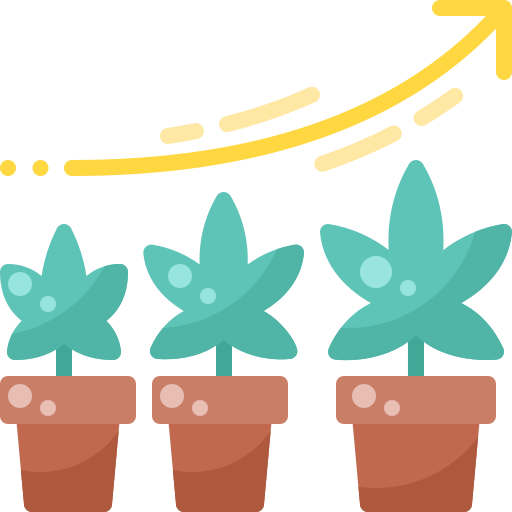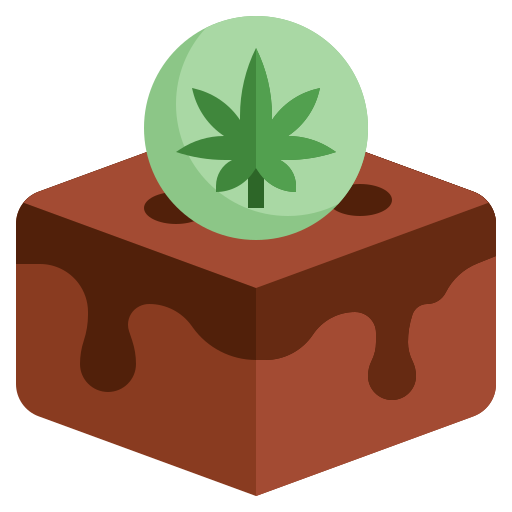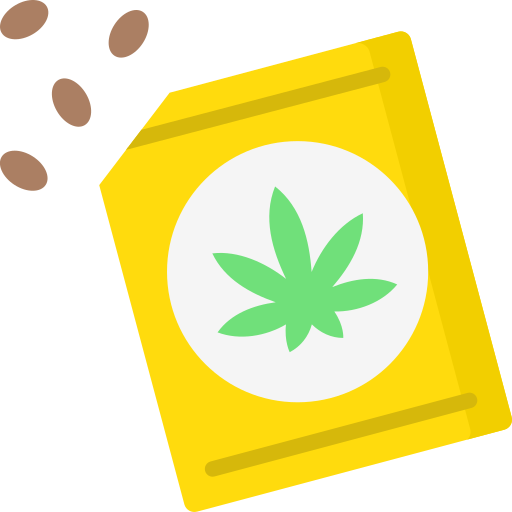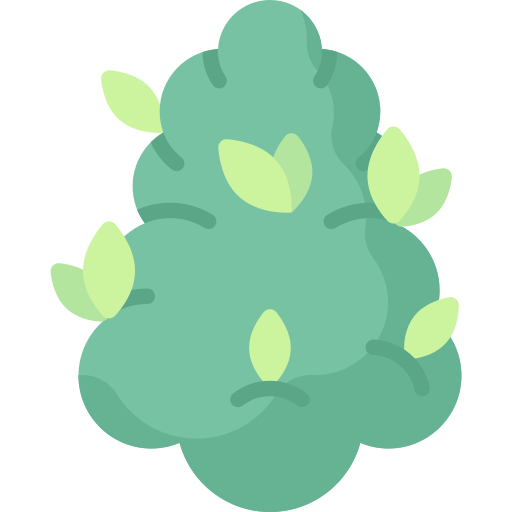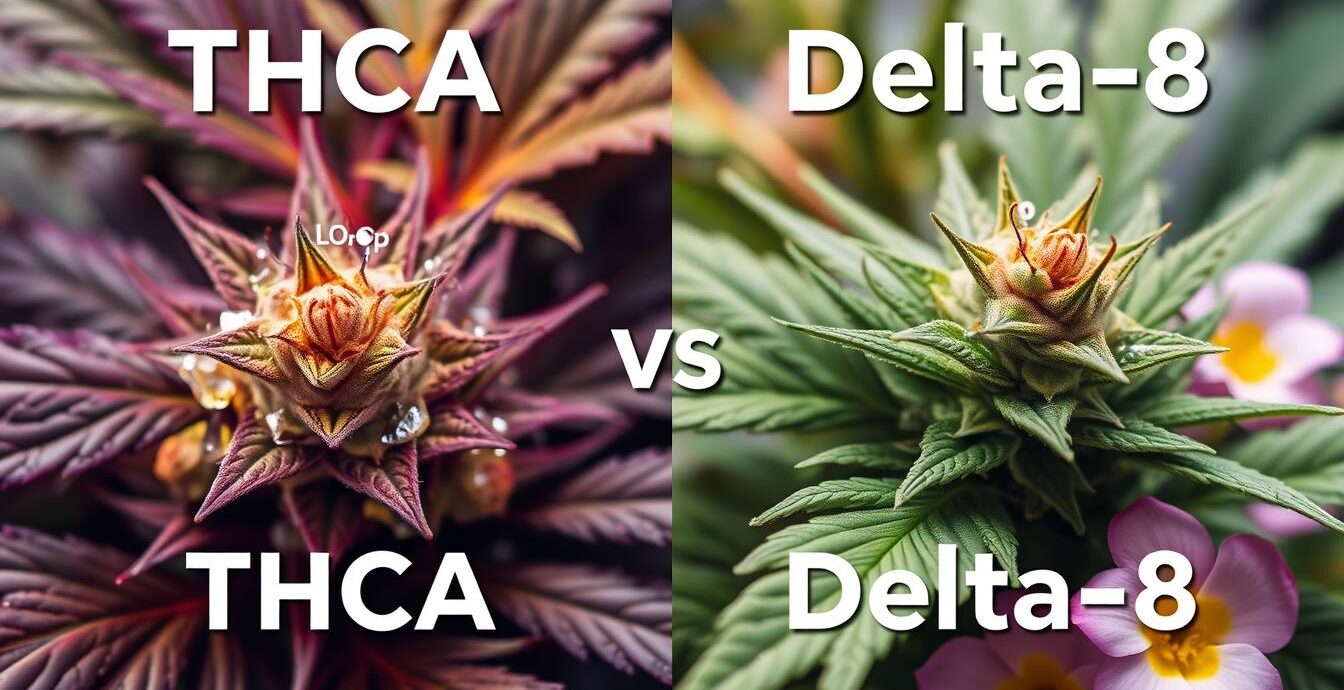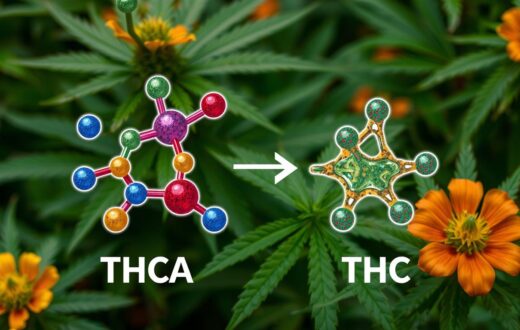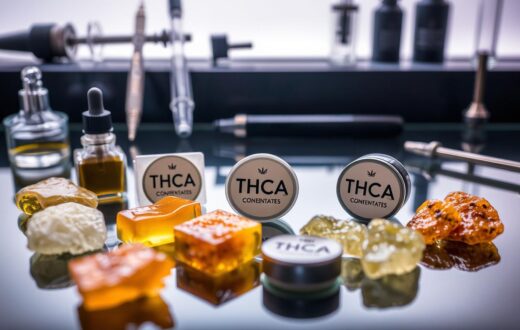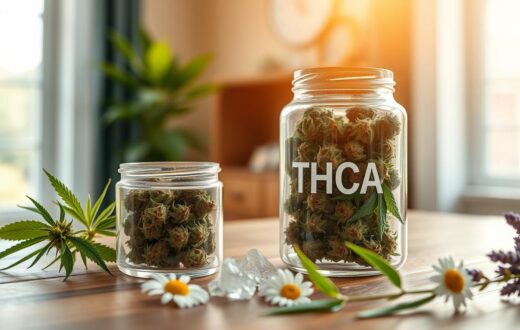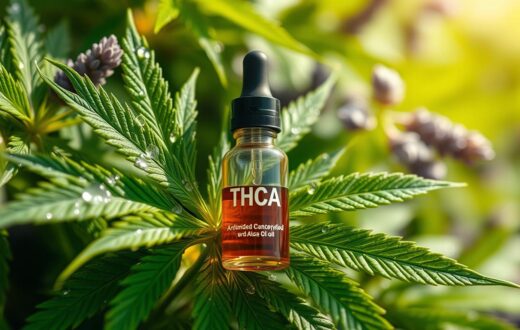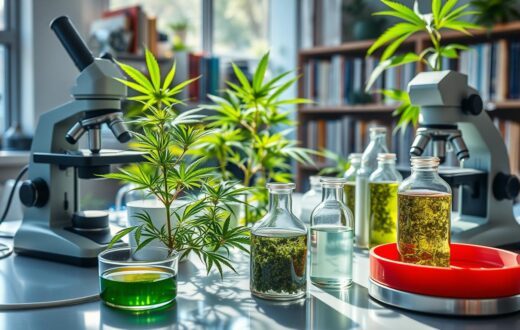Ever wondered why some cannabis compounds make you high while others don’t? The world of cannabinoids is vast and complex. THCA and Delta-8 are two interesting compounds that have caught the attention of both cannabis fans and medical researchers.
THCA is a non-psychoactive precursor to THC, and Delta-8 is a milder version of Delta-9 THC. They have unique properties that make them stand out in the cannabis world. We’ll look into their differences, legal status, and potential benefits.
The 2018 Farm Bill opened the door for hemp-derived products, including THCA and Delta-8. Delta-9 THC in hemp is capped at 0.3%. But THCA isn’t considered THC until it’s heated. This has led to a rise in THCA products, from edibles to live resins, priced between $10 and $200.
Delta-8, known for its milder effects, has become popular. It’s found in vapes, gummies, and other edibles. Even though it’s legal under the Farm Bill, some states have banned it due to concerns about its effects and misuse.
As we compare THCA and Delta-8, we’ll see how they differ in structure, effects, and legal status in the US. Whether you’re new to cannabis or have been using it for a while, knowing about these compounds can help you make better choices.
Introduction to Cannabinoids
Cannabis plants have amazing compounds called cannabinoids. These natural chemicals interact with our bodies in unique ways. Let’s explore what cannabinoids are and why they matter so much in cannabis.
What Are Cannabinoids?
Cannabinoids are special molecules found in cannabis plants. They work with our body’s own system to affect how we feel. Scientists have found over 100 different cannabinoids so far. The most famous ones are tetrahydrocannabinol (THC) and CBD.
Importance of Cannabinoids in the Cannabis Plant
Cannabinoids play big roles in how cannabis plants grow and protect themselves. For humans, these cannabis compounds can have health benefits. Some help with pain, while others might reduce stress.
Hemp-derived cannabinoids are getting more attention lately. They offer similar benefits to marijuana but often with less of a “high” feeling. As we learn more about cannabinoids, we’re finding new ways they might help people feel better.
Understanding THCA
THCA, or tetrahydrocannabinolic acid, is a unique cannabis compound. It’s the most common non-psychoactive cannabinoid in raw cannabis plants. THCA turns into THC, the psychoactive part of cannabis, when heated. Let’s explore this interesting substance further.
What is THCA?
THCA is a non-psychoactive cannabinoid that doesn’t interact with our body’s receptors. It’s the raw form of THC, found in fresh cannabis plants. When cannabis is heated, THCA turns into THC, becoming psychoactive.
How THCA is Produced
THCA is naturally made in cannabis flowers, leaves, and stems. It’s extracted using cold methods to keep its molecular structure intact. For example, in strains with 20% THCA, the THC content after heating is about 17.5%. High THCA percentages in strains like Gorilla Glue and OG Kush show strong effects after heating.
Benefits of THCA
Early studies suggest THCA may have health benefits. It might protect the brain and reduce inflammation. THCA products come in various forms, priced from $10 to $200. THCa Isolate costs between $25.99 and $299.99, while THCa Diamonds range from $29.99 to $399.99. However, the legal status of THCA varies by state because it can become psychoactive when heated.
Understanding Delta-8
Delta-8 THC is a unique cannabinoid that’s gaining popularity in the cannabis world. It offers a different experience compared to its well-known cousin, Delta-9 THC.
What is Delta-8?
Delta-8 THC is a naturally occurring cannabinoid found in small amounts in cannabis plants. It’s known for its milder psychoactive effects compared to Delta-9 THC. This has earned it nicknames like “Diet Weed” or “Light Weed”. Recent studies show that 11.4% of 12th graders in the US reported using delta-8 THC in the past year. Usage rates vary across regions.
How Delta-8 is Produced
Most Delta-8 THC on the market is produced by converting CBD or Delta-9 THC through a process called isomerization. This method allows for larger quantities of Delta-8 to be created. Since it occurs naturally in very small amounts, this process is crucial. The production process impacts the final cannabinoid potency of Delta-8 products.
Benefits of Delta-8
Users report that Delta-8 THC offers several potential benefits. Some find it helps reduce anxiety and improve focus. Interestingly, Delta-8 vape cartridges are said to provide euphoric effects. These effects enhance creativity and concentration for some users.
It’s worth noting that users often double their regular THC doses when consuming Delta-8. This indicates its milder psychoactive effects.
Key Differences Between THCA and Delta-8
THCA and Delta-8 are two unique cannabinoids. They have different properties. Let’s look at their differences to understand their roles in the cannabis world.
Chemical Structure Comparison
THCA is the acid form of THC found in raw cannabis. It turns into THC when heated. Delta-8, however, has a double bond on its 8th carbon chain. This difference affects how they interact with our bodies.
Psychoactive Properties
When comparing thca vs delta-8, their psychoactive effects are notable. THCA is non-psychoactive in its raw form. It doesn’t get you high unless heated. Delta-8, on the other hand, offers a milder high than Delta-9 THC. Users often feel clear-headed and less anxious with Delta-8.
Legal Status in the United States
The legal status of these compounds is complex. THCA is often legal if derived from hemp with less than 0.3% Delta-9 THC. Delta-8’s legal status is unclear. While federally legal under the 2018 Farm Bill, some states have banned it. Always check your local laws before purchasing or using these products.
Health Effects of THCA
THCA is a key part of cannabis that doesn’t make you high. It has many health benefits and is being studied for its uses. Let’s look at what THCA can do and its possible side effects.
Potential Therapeutic Uses
THCA has anti-inflammatory and neuroprotective properties. These make it good for treating many health problems. It might help with nausea, seizures, and even Alzheimer’s disease.
Its ability to fight inflammation without getting you high is a big plus. This makes it very useful for medical treatments.
Risks and Side Effects
The side effects of raw THCA are usually mild. Some people might feel stomach discomfort or get very sleepy. It’s also important to know that THCA can affect how some medicines work.
When THCA is heated, it turns into THC. This can cause the usual effects of cannabis, like feeling high and dry mouth. Remember, the laws about cannabis vary, so check your local laws before using THCA products.
THCA’s non-psychoactive nature makes it appealing for health benefits without the high. But, we need more research to fully understand its effects. Always talk to a healthcare professional before trying any new treatment.
Health Effects of Delta-8
Delta-8 has become popular for its potential benefits. It’s important to know both its good and bad sides. This cannabinoid offers a unique experience with its psychoactive effects and potency.
Potential Therapeutic Uses
Many people find delta-8 helpful for reducing anxiety, improving focus, and easing pain. Its milder effects compared to delta-9 THC make it appealing. Some use it to manage nausea and boost appetite.
Risks and Side Effects
Despite its benefits, delta-8 can have side effects. Common issues include dry mouth, red eyes, and a faster heart rate. Too much can cause anxiety or paranoia.
In 2022, the FDA got over 100 reports of delta-8 problems, with more than half needing medical help. Poison center calls about delta-8 went up 82% from 2021 to 2022, with 3,358 cases. These calls often involve kids accidentally taking it or adults having bad reactions.
The lack of rules makes people worry about product safety. Studies show delta-8 products might have more THC than said and harmful byproducts. It’s key to use delta-8 wisely and know its possible side effects. We need more research on its long-term health effects.
Consumption Methods
Cannabis compounds come in many forms to fit different tastes and needs. THCA and Delta-8 are two special compounds with unique effects and ways to use them.
How to Consume THCA
THCA is found in raw cannabis leaves and doesn’t make you feel high. It’s best to use it fresh or lightly processed. Many people juice raw cannabis or mix it into smoothies.
THCA products like isolates and diamonds are also out there, priced from $25.99 to $399.99. You can add these to food or drinks for a non-psychoactive experience.
How to Consume Delta-8
Delta-8 is a rare compound made through isomerization. It’s popular in vaping, edibles, and tinctures. Delta-8 products range from distillates ($6.99 – $799.00) to gummies ($29.99) and live resin ($13.99 – $274.99).
These products offer different levels of psychoactive effects. So, new users should start with small doses.
Both THCA and Delta-8 come in many forms. This lets users pick based on what they want. Whether for health benefits or a mild high, knowing how to use these compounds is key.
Popularity and Market Trends
The cannabis market is booming, with hemp-derived products leading the way. These products are changing the industry. Recent data shows what people like and how the market is growing.
Growing Interest in THCA
THCA is becoming more popular among cannabis fans. It doesn’t get you high but might offer health benefits. Yet, only 56% of adults know it’s not the main psychoactive part of cannabis.
Delta-8’s Rise in Popularity
Delta-8 is skyrocketing in the hemp market. By Q2 2024, 5.6% of U.S. adults used it. It was the top hemp product in 2023, making $1.2 billion and taking 44% of the U.S. market.
The U.S. hemp market grew by 1,283% from 2020 to 2023, hitting nearly $2.8 billion. Easy access is a big reason people buy these products. Gummies are the favorite, with over 60% of people choosing them.
These trends show more people are open to different cannabis products. As more people learn about them, we’ll see even more new products and growth.
User Experiences and Anecdotal Evidence
Cannabis users share their stories, giving us a peek into how different compounds affect them. These tales help us grasp how various cannabis compounds can impact people in unique ways.
THCA User Reviews
People who use THCA often talk about its benefits without the usual high. They say it helps with pain and reduces swelling when eaten raw. One user said, “I make juice from raw cannabis leaves for my arthritis. It’s changed how I manage pain, without getting high.”
Another person mentioned, “THCA tinctures have made my nausea during chemo treatments better.”
Delta-8 User Reviews
Delta-8 users talk about a softer high compared to regular THC. They say it makes them feel more alert and focused. A user noted, “Delta-8 gives me a gentle buzz without the anxiety I sometimes get from regular weed.”
Another user said, “I love how Delta-8 helps me relax after work without feeling too impaired.” These stories hint that Delta-8 might offer a balanced experience for some.
Even though user experiences are valuable, it’s key to remember that everyone reacts differently to cannabis compounds. More research is needed to fully grasp how these cannabinoids affect our bodies.
Regulatory Considerations
The world of cannabis legality is complex and always changing. As the industry grows, rules for hemp keep evolving. This creates challenges for both consumers and businesses.
Current Regulations for THCA
THCA sits in a legal gray area. The 2018 Farm Bill says hemp is cannabis with less than 0.3% delta-9 THC. But it doesn’t directly talk about THCA, leading to different views.
Some states, like California, count THCA in “total THC” calculations. Others, such as Pennsylvania and New Jersey, see plant acids as separate.
Current Regulations for Delta-8
Delta-8’s legal status is also unclear. Hemp products are federally legal, but some states have banned or restricted them. Nebraska, for example, says synthetic delta-8 THC is illegal.
Florida is thinking about THC limits in hemp products. South Dakota wants to ban chemically modified hemp derivatives.
The hemp market made over $2 billion from delta-8 products in 2021 and 2022. This growth has caught regulators’ attention. The DEA is making rules to ban synthetic cannabinoids.
A federal appeals court said delta-8 is not controlled in 2022. As debates go on, it’s important for consumers to know local laws. This helps them navigate this changing world safely.
Comparing Cost and Availability
The cannabinoid market has grown a lot. It now offers many hemp-derived products. THCA and Delta-8 products have different prices and availability in the US. Let’s look at the cost and how easy they are to find.
THCA Pricing and Availability
THCA products are getting easier to find. Raw cannabis and hemp flowers often have a lot of THCA. Prices for THCA items range from $10 to $200, depending on the type and quality.
You can find THCA in many products, like pre-rolls, flower, and concentrates. These products need to be heated to work, as THCA itself doesn’t get you high without heating.
Delta-8 Pricing and Availability
Delta-8 products are becoming more popular. They are easy to find online and in hemp shops. The price of Delta-8 items changes based on things like how strong it is, what it is, and who makes it.
Delta-8 is often made in a lab because it’s rare in nature. You can find it in gummies, vape cartridges, tinctures, and topicals. These products don’t need to be heated to work, making them easy to use.
Both THCA and Delta-8 products are usually legal under the 2018 Farm Bill, as long as they have less than 0.3% Delta-9 THC. But, where you can buy them might change based on your state’s laws. When picking between THCA and Delta-8, think about what you want, how you like to use it, and your local laws.
Interaction with Other Cannabinoids
Cannabis compounds interact in complex ways, creating unique effects. The relationship between THCA and Delta-9 THC is crucial for understanding how cannabis works. Delta-8 also plays a role in these cannabinoid interactions.
THCA and Delta-9 THC Relationship
THCA is the non-psychoactive precursor to Delta-9 THC. When heated, THCA transforms into THC, the compound responsible for the plant’s psychoactive effects. This process, called decarboxylation, is key to unlocking the full potential of cannabis.
Raw THCA offers benefits like reduced inflammation without intoxication. This makes it popular among those seeking therapeutic effects without the high.
Delta-8 and Its Interactions with Cannabinoids
Delta-8 THC is a milder cousin of Delta-9 THC. It interacts with the body’s endocannabinoid system, but with less intensity. Users report a gentler psychoactive experience compared to Delta-9.
Delta-8 can work alongside other cannabis compounds, potentially enhancing their effects. This synergy between different cannabinoids is known as the entourage effect. It may boost the overall therapeutic benefits of cannabis products.
Research shows that over 125 cannabinoids exist in Cannabis sativa. Each of these compounds can influence the others, creating a wide range of possible effects. As we learn more about these interactions, we gain a deeper understanding of how cannabis affects the human body.
Conclusion: THCA vs Delta-8
As we finish our look at THCA vs Delta-8, it’s clear they have special qualities in the world of cannabis. Cannabis has been used for over 4,000 years. We’ve learned a lot about these hemp products since then.
Summary of Key Points
THCA is a non-psychoactive form of THC that needs heat to become active. This happens between 220-245°F. Delta-8, made from hemp, has milder effects, about 40% less than Delta-9 THC. Both have become popular since California allowed medicinal cannabis in 1996.
Making the Right Choice for You
Think about what you want when choosing between THCA and Delta-8. THCA doesn’t get you high, but Delta-8 gives a softer effect. Remember, heating THCA flower makes it about 20% Delta-9 THC. Delta-8 flower is about 12% Delta-9 THC. Always check local laws, as rules for these products change.
